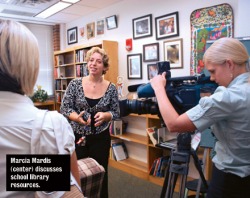
Marcia Mardis wants school libraries to continue being the center of learning. That’s why the assistant professor at Florida State University’s (FSU) School of Library and Information Studies is using a $400,000 grant from the Institute for Museum and Library Services to explore how K-12 media centers can integrate digital resources into their collections and services as quickly and easily as they collect traditional resources.
A former library media specialist herself, Mardis will share her insight at the summit, where she's moderating the panel:
"Leading 21st Century Skills with Your Collection: Infusing New Science Resources into Teaching, Learning, and Thinking"
Saturday October 3
9:45 - 11 am and 11:15 a, to 12:30 pm
Capitol Room A
Hyatt Regency Washington
Mardis's study is detailed in the September issue of SLJ. We spoke one on one with Mardis about the project:
How did this study come about?
When I was a media specialist at a science and math school, the Internet was just starting to explode and I had no good way to integrate all of the new science-related Web sites into my collection. Let's face it, the html "link farm" approach to collecting digital resources just doesn't cut it as an organization tool!
I also have the great opportunity to work with the National Science Digital Library and want to get all of the great resources we have into the hands of teachers and students. I firmly believe that the best way to do this is to integrate them into the school library's collection
What do you hope to achieve?
This project reflects my desire to use these experiences to help media specialists increase their confidence with digital resources. In the first phase of the project, I will survey media specialists across the country about their current uses of and desires for digital resources. (SLJ readers—if you see an announcement about the survey, please take a moment to complete it!)
Concurrent with the survey, I will work with programmers to develop a tool that digital library developers can use to alert people to resources in their digital libraries right from the desktop. Now, I'm thinking that the tool will probably be RSS-based. It will do more than just give them descriptions of the resources, it will include links to downloadable MARC records that can be ingested into the OPAC.
Mardis hopes to develop the technology by February 2010 and start testing it in select schools in the spring. Librarians interested in piloting one of the programs can contact her this fall as she’s searching for volunteers. Email Mardis at [email protected].
“We’ll work with [the volunteers] to give them the confidence to collect more resources,” says Mardis. “And then, they’ll have the confidence to teach the teachers as well.”
A former library media specialist herself, Mardis will share her insight at the summit, where she's moderating the panel:
"Leading 21st Century Skills with Your Collection: Infusing New Science Resources into Teaching, Learning, and Thinking"
Saturday October 3
9:45 - 11 am and 11:15 a, to 12:30 pm
Capitol Room A
Hyatt Regency Washington
Mardis's study is detailed in the September issue of SLJ. We spoke one on one with Mardis about the project:
How did this study come about?
When I was a media specialist at a science and math school, the Internet was just starting to explode and I had no good way to integrate all of the new science-related Web sites into my collection. Let's face it, the html "link farm" approach to collecting digital resources just doesn't cut it as an organization tool!
I also have the great opportunity to work with the National Science Digital Library and want to get all of the great resources we have into the hands of teachers and students. I firmly believe that the best way to do this is to integrate them into the school library's collection
What do you hope to achieve?
This project reflects my desire to use these experiences to help media specialists increase their confidence with digital resources. In the first phase of the project, I will survey media specialists across the country about their current uses of and desires for digital resources. (SLJ readers—if you see an announcement about the survey, please take a moment to complete it!)
Concurrent with the survey, I will work with programmers to develop a tool that digital library developers can use to alert people to resources in their digital libraries right from the desktop. Now, I'm thinking that the tool will probably be RSS-based. It will do more than just give them descriptions of the resources, it will include links to downloadable MARC records that can be ingested into the OPAC.
Mardis hopes to develop the technology by February 2010 and start testing it in select schools in the spring. Librarians interested in piloting one of the programs can contact her this fall as she’s searching for volunteers. Email Mardis at [email protected].
“We’ll work with [the volunteers] to give them the confidence to collect more resources,” says Mardis. “And then, they’ll have the confidence to teach the teachers as well.”
 RSS Feed
RSS Feed